2024-2025, 1st semester
Lecture series: Local Communities at the Slavic-Italian-German Borderland, see more at the event’s page.
April, 21st, 2023: Walls of Remembrance: A Comparative Approach to Murals and War Memory
Instytut Slawistyki Zachodniej i Południowej UW, Kampus Główny, Krakowskie Przedmieście 26/28, room 5, 10.00 am.
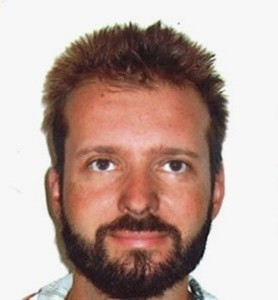
Our guest will be prof. Vjeran Pavlaković (University of Rijeka, Croatia). He will held a lecture, followed by the discussion, on a comparative approach to murals and war memory. Here’s how he describes his research: “
While monuments, street names, memorial museums, and commemorative practices remain at the center of struggles over contested histories in the former Yugoslavia, graffiti, murals and other forms of street art are increasingly serving as new frontlines for these battles over the past. Collective remembrance can facilitate “dealing with the past”, but also allows mnemonic actors to perpetuate ethno-nationalist discourses and hinder reconciliation in post-conflict societies. Once considered subversive and exclusively in the realm of subculture, murals are now reproducing official state war narratives across the region. This research examines the impact this new form of memorialization has on post-Yugoslav societies thirty years after the conflict ended, specifically on bilateral relations between Bosnia-Herzegovina, Croatia, and Serbia. Drawing on almost two decades of fieldwork on memoryscapes of war, this paper seeks to understand how murals fit into the larger mosaic of mnemonic production: who is financing them, who is creating them, what is the legal framework for graffiti in public space, and what kind of typologies emerge when analyzing them across the region. While football Ultras (hooligans) have always been active in graffiti actions to demarcate territory and challenge rivals, in recent years this has shifted beyond tagging, vandalism, and radical right hate speech into aesthetically impressive murals that at times also function as semi-official sites of memory, indicating a troubling resurgence of nationalist politics intertwined with the aggressive street culture of disenchanted youth in the Yugoslav successor states. Furthermore, the paper seeks to place the ex-Yugoslav graffitiscape into a broader comparative context with the production and reception of mnemonic murals (both state-financed and bottom-up initiatives) in other post-conflict states, such as Poland, Spain, Northern Ireland, and the United States.”
The scientific profile of our guest can be found here.
May 30th, 2022: Poezija posle Srebrenice? Kulturna slika jugoslovenskih osamdesetih
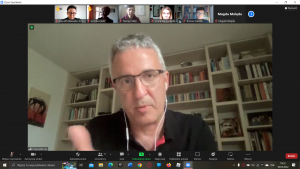
Prof. Mitja Velikonja (Chair of Cultural Studies, University of Lublana) was our guest at another PROP seminar. He presented his research on the cultural image of the Yugoslav 80s in arts, cinema, and other practices in the public sphere. A disussion which followed related Velikonja’s conclusions with the question of the post-Yugoslav as a research category, as well as to the conceptualization of the Yugoslav legacy in the contemporary reflexion (not only) in the Yugoslav successor states.
More abour our guest, with selected bibliography, can be found here.
May 23rd, 2022 Sjećanje na Domovinski rat i komemorativne prakse u Hrvatskoj
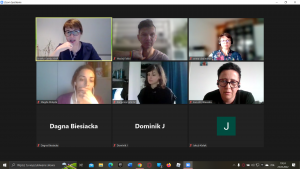
The memory of the Homeland War and commemorative practices was the subject of another seminar held at PROP. Branka Vierda (Youth Iniciative for Human Rights, Croatia) and Aneta Velimirović (Serbian National Council. Croatia) discussed about policy of memory in Croatia. Especially the problem of ignored, or inconvenient memory was tuckled, as both guests represented a vision of memory prectices alternative to the meinstream discourse.
March 4th, 2022 Rituals of institutionalization
Prof. dr. Leo Rafolt delivered a lecture on ‘rituals of institutionalization,’ based on his research on Montažstroj, Croatian performance group. The lecture re-examines some of the neo-avant-garde ritual attempts in the ex-Yugoslav context, precisely in a period of transition between its postmodernist and post-Socialist legacy. This problem is, thus, put in the context of a complex relationship between the avant-garde habitus and its counterp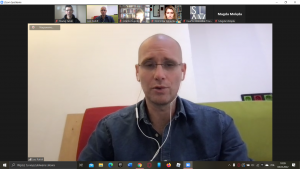 arts in the era of high modernism, i.e., its implications in the symbolic and cultural field of popular culture. Bourdieu’s notions are, therefore, primarily applied on Montažstroj’s early in situ cations and performance works, eager to institutionalize the group inside of the (ex-)Yugoslav field.
arts in the era of high modernism, i.e., its implications in the symbolic and cultural field of popular culture. Bourdieu’s notions are, therefore, primarily applied on Montažstroj’s early in situ cations and performance works, eager to institutionalize the group inside of the (ex-)Yugoslav field.
Jan. 28th, 2022 Međugeneracijski prijenos sjećanja na rat 90-tih u familijama opkoljenog Sarajeva
PROP kindly invites you to the seminar which will be held on-line. Our gest will be Emina Zoletić (Doctoral School of Social Sciences, University of Warsaw). The presentation and discussion will be held in Croatian/Serbian/Bosnian; if you are interested in participating, please contact M. Falski via e-mail (mfalski(a)uw.edu.pl). Here are more details on the subject:
Koliko se ratna sjećanja čuvaju, preoblikuju, selektivno prenose i ili zaboravljaju u obiteljima? Kako druga generacija pamti iskustva rata njihovih roditelja? Što je sa obiteljima koje su migrirale i izbjegle tijekom i poslije rata te se nisu vratile u Sarajevo? Kako i na koji način se sjećanja formiraju u današnjim okolnostima onih koji su dislocirani izvan Bosne i Hercegovine i onih koji su tamo nastavili da zive? Kako su se formirali identiteti mladih osoba nakon rata?
19.04.2021 Seminar PROP 01/2021 “Jugoslovenski socijalizam i posle njega: pogled kroz prizmu klase”
Another on-line meeting in the pandemic era was devoted to the category of class and its relevance in describing processes of the social transformation in the post-Yugoslav area. Our guest was dr.sc. Tanja Petrović from the Institute of culture and memory studies, Slovenian academy of sciences and arts).
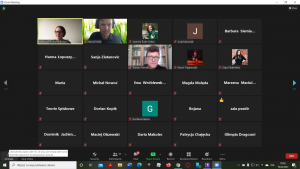
03.12.2020 Seminar PROP 05/2020 “The Post-socialist city in the Czech context”
We continue to discuss problems of the cultural and social transformation in urban communities, this time in 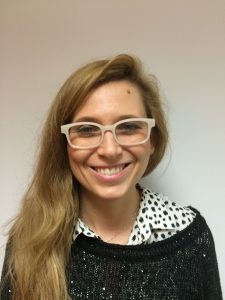 a broader context of the post-socialist Europe. Our guest was dr. sc. Linda Kovářová, anthropologist and historian from the Charles University. She held a lecture on the question of the social and cultural processes, taking place in the post-Soviet area, with special overview of the Czech situation, from the beginning of the 1990s. Several important aspects of the transformation were discussed, such as a difference between small and medium-size towns and big cities, identity on borderlands and in regions with an interrupted social history, and relevance of general categories like the ‘post-socialist’ and ‘post-Yugoslav.’
a broader context of the post-socialist Europe. Our guest was dr. sc. Linda Kovářová, anthropologist and historian from the Charles University. She held a lecture on the question of the social and cultural processes, taking place in the post-Soviet area, with special overview of the Czech situation, from the beginning of the 1990s. Several important aspects of the transformation were discussed, such as a difference between small and medium-size towns and big cities, identity on borderlands and in regions with an interrupted social history, and relevance of general categories like the ‘post-socialist’ and ‘post-Yugoslav.’
19.05.2020 Seminar PROP 04/2020 “Socijalistička modernizacija, ideologija i svakodnevica u ritmu uobičajene jugoslavenske godine” [Socialist modernization, ideology, and everyday life in the rythm of an ordinary Yugoslav year]
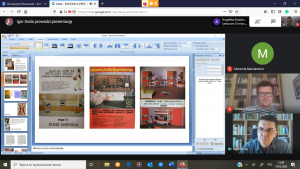 Our next guest was prof. dr. sc. Igor Duda from Juraj Dobrila University in Pula. His lecture, and the following discussion, were focused on practices of everyday life in socialist Yugoslavia, the rise and development of the popular culture in socialist Croatia, and the consumer society in its Yugo-socialist version.
Our next guest was prof. dr. sc. Igor Duda from Juraj Dobrila University in Pula. His lecture, and the following discussion, were focused on practices of everyday life in socialist Yugoslavia, the rise and development of the popular culture in socialist Croatia, and the consumer society in its Yugo-socialist version.
21.04.2020 Seminar PROP 02/2020 “Slučaj Borovo” [A Borovo Case]
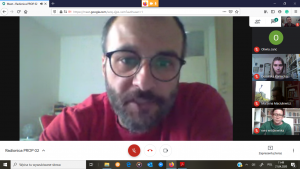 Although mobility has been suspended, we try to develop our scientific network and return to regular meetings on-line. The second seminar in the ‘Post-Yugoslav City’ cycle was held by dr. sc. Sven Cvek (Department of English Studies, Faculty of Humanities and Social Sciences, University of Zagreb). His presentation was focused on the Borovo factory (kombinat Borovo) near Vukovar and the problem of the social transition from the Yugoslav to the post-Yugoslav system. Presentation and discussion dealt mainly with the question of the workers’ movement, social categorization, and categorization produced by contemporary discourses relating to the socialist past.
Although mobility has been suspended, we try to develop our scientific network and return to regular meetings on-line. The second seminar in the ‘Post-Yugoslav City’ cycle was held by dr. sc. Sven Cvek (Department of English Studies, Faculty of Humanities and Social Sciences, University of Zagreb). His presentation was focused on the Borovo factory (kombinat Borovo) near Vukovar and the problem of the social transition from the Yugoslav to the post-Yugoslav system. Presentation and discussion dealt mainly with the question of the workers’ movement, social categorization, and categorization produced by contemporary discourses relating to the socialist past.
You can find more information about our guest here, and the presentation of the research on Borovo by the Borovo group here.
14.04.2020 Seminar PROP 01/2020 “Miasto podzielone. Przypadek Mitrovicy” [Divided City. A Case Study of Mitrovica]
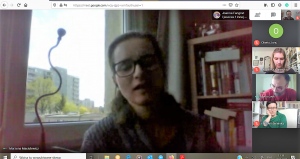 The seminar was held by mgr Marzena Maciulewicz (Faculty ‘Artes Liberales’, University of Warsaw/Institute of Slavic Studies, Polish Academy of Sciences] within the frame of the students’ scholarly project entitled ‘Miasto postjugosłowiańskie’ [A Post-Yugoslav City]. Mgr. Maciulewicz presented reasons and results of her fieldwork in Kosovska Mitrovica/Mitrovicë, which took place in 2012-2018. She emphasized both the methodological backgrounds of the research and different ways of experiencing the urban space by local dwellers.
The seminar was held by mgr Marzena Maciulewicz (Faculty ‘Artes Liberales’, University of Warsaw/Institute of Slavic Studies, Polish Academy of Sciences] within the frame of the students’ scholarly project entitled ‘Miasto postjugosłowiańskie’ [A Post-Yugoslav City]. Mgr. Maciulewicz presented reasons and results of her fieldwork in Kosovska Mitrovica/Mitrovicë, which took place in 2012-2018. She emphasized both the methodological backgrounds of the research and different ways of experiencing the urban space by local dwellers.
A short presentation and contact with our guest can be found here.
15.06.2019 Performing Divisions in Central and South-Eastern European Cities — panel discussion
PROP will participate in the annual Summer Convention of the ASEEES (Association for Slavic, East-European and Eurasian Studies), which will take place in Zagreb 14th–16th June. We invite to take part in the panel session, which will be followed by discussion. Members of our group will present following issues: Tomasz Rawski: “Nationalists from Within: Intra-Bosniak Memory Struggles over the Siege of Sarajevo in Post-war Bosnia and Herzegovina“; Maciej Falski, “Conflicts around Reconstruction of Mosques in Bosnia and the Question of an (Imaginary) Multiculturality“; Ewa Wróblewska-Trochimiuk, “Images of Divisions: Visual Articulations of Culture Wars in the Former Yugoslavia after 2000“; and Dominika Kaniecka will be a chair of the panel.
We wait for you on Saturday, June 15th, in the room A122 at 2.30 p.m. at the Faculty of Humanities and Social Sciences (Filozofski fakultet), Lucića st. 3. For more info: see ASEEES web site.
23-29.03.2019, Dragan Damjanović in Warsaw
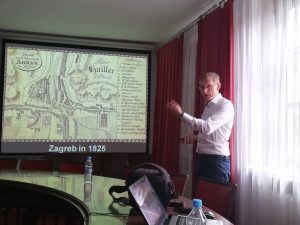
Dr.sc. Dragan Damjanović, art and architecture historian from the University of Zagreb, was our guest in the frame of the project on “Practicing community: methods and perspectives”. We discussed how the historical perspective could contribute to our research on community practices, so as the question related to community/identity-making with architecture as an ideological instrument. Another interesting topic that allowed us to share ideas was the outlook of practices in the field of architecture in the late Habsburg era. Dragan Damjanovic gave also a lecture on Austro-Hungarian Zagreb: architecture and urban planning 1850-1918, co-organized with dr Aleksander Łupienko from the Institute of History of the Polish Academy of Sciences.
More about our guest and a selection of his works can be found here.
04-08.03.2019, Xavier Bougarel at PROP
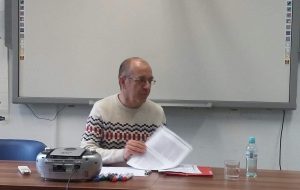
Xavier Bougarel, chargé de recherche from CETOBaC (Centre des études turques, ottomanes, balcaniques et cetrasiatiques, EHESS, Paris), was our guest at the first week of March. He gave the lecture entitled After Empires: Islam and national identity in Bosnia-Herzegovina, co-organized with the Polish Commission of Balkan Culture and History (AIESEE). As Mr. Bougarel is one of the leading scholars in the domain of Bosnian Islam and the recent history of the country, we have presented an overview of complex socio-political contexts of the nation-building process of Boshniaks, what will help us to understand better choices of Muslim elites in Bosnia and complicated identitary policies in that country. PROP organized also a seminar, focused on questions of the post-Dayton Bosnia on the on hand, and of the methods and problems of the research in that country. Mr. Bougarel shared with us his rich experience of doing fieldwork in Bosnia.
More about our guest and the bibliography of his works can be found here.
28-29.01.2019, prof. Christian Voß at PROP
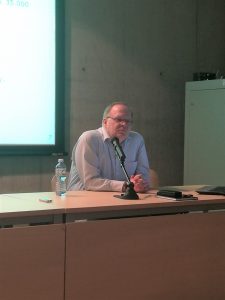
Professor Christian Voß from the Institute of Slavic Studies and Hungarian Studies at the Humboldt University, Berlin, was our guest. He gave the open lecture untitled Ethnic revival, transnationalism, and language loyalty among Slavic-speaking Christian and Muslim minorities in Greece. We could hear a fascinating overview of Christian Voß’s research in Greek Macedonia and in Greek Thrace. His narrative was centered on language practices of everyday life, phenomena of language shifting in everyday communication, and language and identity policy of local elites. On the second day, we had a seminar led by him, where the question of Monitoring and conceptualizing the Post-Serbocroatian space was presented and discussed.
12.10.2018, dr. sc. Renata Jambrešić-Kirin at PROP
Dr. sc. Renata Jambrešić-Kirin from the Institute of Ethnology and Folklore Research in Zagreb (Croatia) was our guest. She gave a lecture for our research group and students on the topic Između straha, ponosa i predrasuda: humorne reprezentacije hrvatske predsjednice (Between fear, pride, and prejudice: humorous representations of the president of Croatia).
10-13.06.2018, PROP hosted prof. Sabrina Ramet in Warsaw
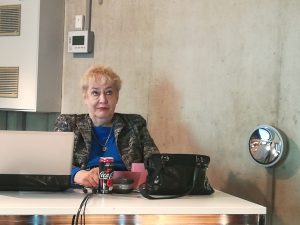
On the first day, Prof. Ramet led a seminar at the Institute of Southern and Western Slavic Studies on the socio-political situation in Macedonia after the dissolution of Yugoslavia. After prof. Ramet outlined the dynamics of democratic changes in this country, the discussants moved the conversation to questions of possible alternative to nationalisms, comparison of Macedonian and Bosnian case, and personal involvement of scholars.
On the second day, Prof. Ramet gave an open lecture on ‘Building Democracy in the Yugoslav Successor States’, during which she elaborated on various dimensions and trends of post-communist transition in the Balkans. While the lecture provided mostly comparative analysis of ‘hard’ indicators of democratization process in the period 1991-2017 – such as media freedom index, corruption index and other – the following discussion went more towards reflection on the contemporary situation in the region. We talked, among other things, about relationships between authoritarianism and economic freedom and the prospects for further democratization in the region in rapidly changing geopolitical context.
It was a pleasure for us to host prof. Ramet at our University.
7.06.2018, Thursday
PROP had a pleasure to host prof. Robert Hayden (University of Pittsburgh). He gave a lecture on Religiously Nationalizing the Landscape and Conflicting Commemoration in Bosnia–Herzegovina, where he presented an inspiring approach to the landscape, or ‘natioscape,’ in Bosnia, presenting some aspects of his newest research on the antagonistic tolerance, involving other scholars from different countries (India, Bulgaria, Portugal). After the lecture, he took part in the seminar where we discussed among other questions on international presence in Bosnia. More about prof. Hayden’s academic activities and a selected bibliography of his works can be found here.
6.03.2018
Ph.D. Olimpia Dragouni (Humboldt-Universitat zu Berlin) was a guest of the PROP. She held an open lecture on the historical and socio-cultural context of the Greek-Macedonian conflict regarding the name “Macedonia”, and she talked about her research on the tourism around the Greeko-Macedonian border. She gave also a deepen presentation of her research, accompanied by discussion, for members of the center.
27.04.2017, Thursday
PROP had the pleasure to invite students and researchers to the workshop and lecture given by prof. dr. Ildiko Erdei from the Institute of Ethnology and Anthropology at the University of Belgrade. Both workshop and lecture, so as the discussion, were held in Serbian. The subjects treated by the visiting guest were: “Teren”: izazovi istraživanja događaja u pokretu [‘The Field’: challenges of research on going-on phenomena], and Jugoslovenski san” i ono što je došlo posle: potrošačka kultura u socijalizmu i postsocijalističkom kapitalizmu [The Yugoslav dream and that what came after: consumer culture in socialism and postsocialist capitalism].
21.02.2017
Post-Yugoslav Area Research Center has been officially established by the decision of the Faculty Council, Faculty of Polish Studies at the University of Warsaw, adopted the 21.02.2017.
